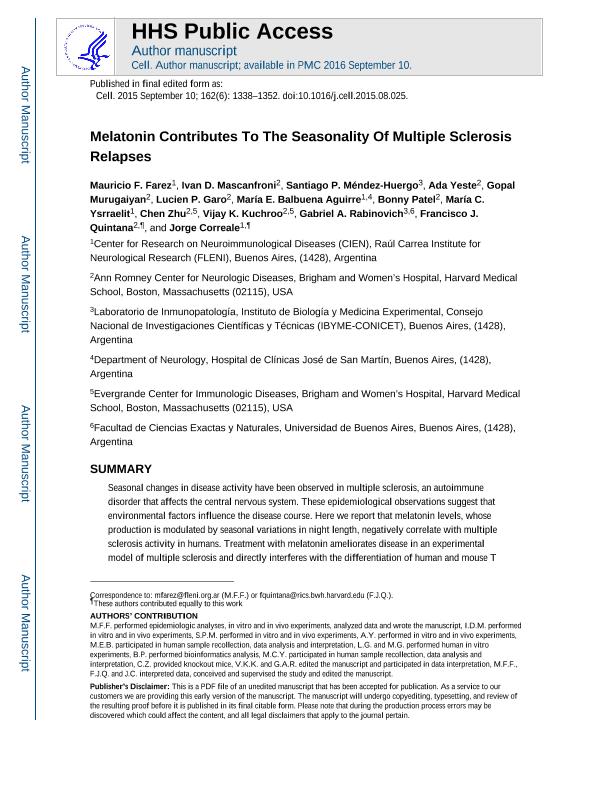Artículo
Melatonin contributes to the seasonality of multiple sclerosis relapses
Farez, Mauricio Franco ; Mascanfroni, Ivan Darío
; Mascanfroni, Ivan Darío ; Mendez Huergo, Santiago Patricio
; Mendez Huergo, Santiago Patricio ; Yeste, Ada; Murugaiyan, Gopal; Garo, Lucien P.; Balbuena Aguirre, María E.; Patel, Bonny; Ysrraelit, María C.; Zhu, Chen; Kuchroo, Vjay K.; Rabinovich, Gabriel Adrián
; Yeste, Ada; Murugaiyan, Gopal; Garo, Lucien P.; Balbuena Aguirre, María E.; Patel, Bonny; Ysrraelit, María C.; Zhu, Chen; Kuchroo, Vjay K.; Rabinovich, Gabriel Adrián ; Quintana, Francisco; Correale, Jorge
; Quintana, Francisco; Correale, Jorge
 ; Mascanfroni, Ivan Darío
; Mascanfroni, Ivan Darío ; Mendez Huergo, Santiago Patricio
; Mendez Huergo, Santiago Patricio ; Yeste, Ada; Murugaiyan, Gopal; Garo, Lucien P.; Balbuena Aguirre, María E.; Patel, Bonny; Ysrraelit, María C.; Zhu, Chen; Kuchroo, Vjay K.; Rabinovich, Gabriel Adrián
; Yeste, Ada; Murugaiyan, Gopal; Garo, Lucien P.; Balbuena Aguirre, María E.; Patel, Bonny; Ysrraelit, María C.; Zhu, Chen; Kuchroo, Vjay K.; Rabinovich, Gabriel Adrián ; Quintana, Francisco; Correale, Jorge
; Quintana, Francisco; Correale, Jorge
Fecha de publicación:
10/09/2015
Editorial:
Cell Press
Revista:
Cell
ISSN:
0092-8674
e-ISSN:
1097-4172
Idioma:
Inglés
Tipo de recurso:
Artículo publicado
Clasificación temática:
Resumen
Seasonal changes in disease activity have been observed in multiple sclerosis, an autoimmune disorder that affects the CNS. These epidemiological observations suggest that environmental factors influence the disease course. Here, we report that melatonin levels, whose production is modulated by seasonal variations in night length, negatively correlate with multiple sclerosis activity in humans. Treatment with melatonin ameliorates disease in an experimental model of multiple sclerosis and directly interferes with the differentiation of human and mouse T cells. Melatonin induces the expression of the repressor transcription factor Nfil3, blocking the differentiation of pathogenic Th17 cells and boosts the generation of protective Tr1 cells via Erk1/2 and the transactivation of the IL-10 promoter by ROR-α. These results suggest that melatonin is another example of how environmental-driven cues can impact T cell differentiation and have implications for autoimmune disorders such as multiple sclerosis.
Archivos asociados
Licencia
Identificadores
Colecciones
Articulos(IBYME)
Articulos de INST.DE BIOLOGIA Y MEDICINA EXPERIMENTAL (I)
Articulos de INST.DE BIOLOGIA Y MEDICINA EXPERIMENTAL (I)
Citación
Farez, Mauricio Franco; Mascanfroni, Ivan Darío; Mendez Huergo, Santiago Patricio; Yeste, Ada; Murugaiyan, Gopal; et al.; Melatonin contributes to the seasonality of multiple sclerosis relapses; Cell Press; Cell; 162; 6; 10-9-2015; 1338-1352
Compartir
Altmétricas



